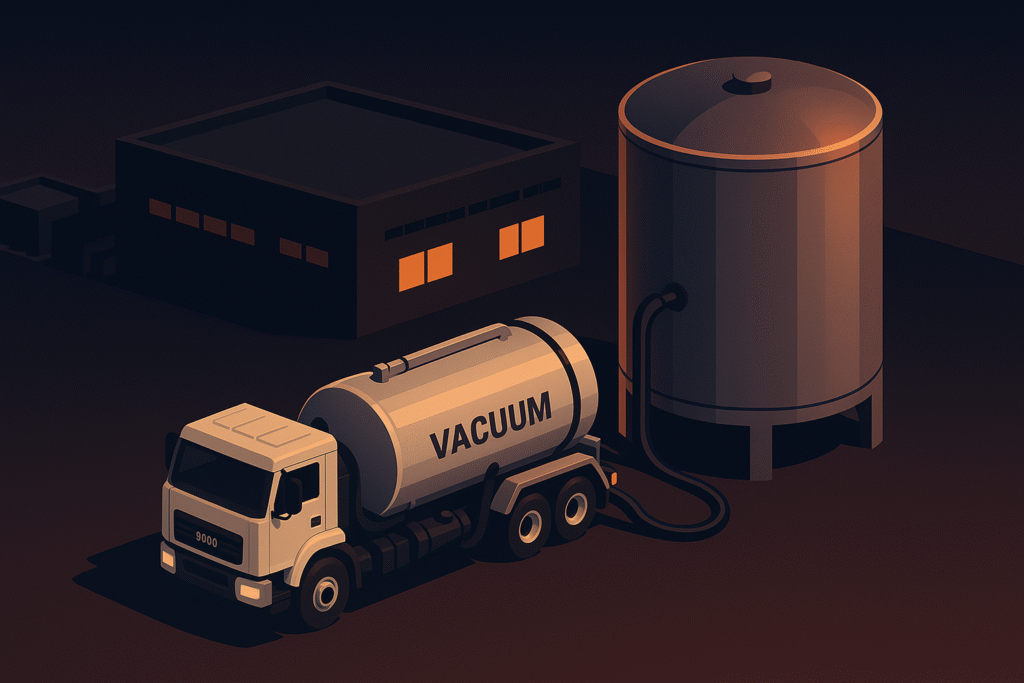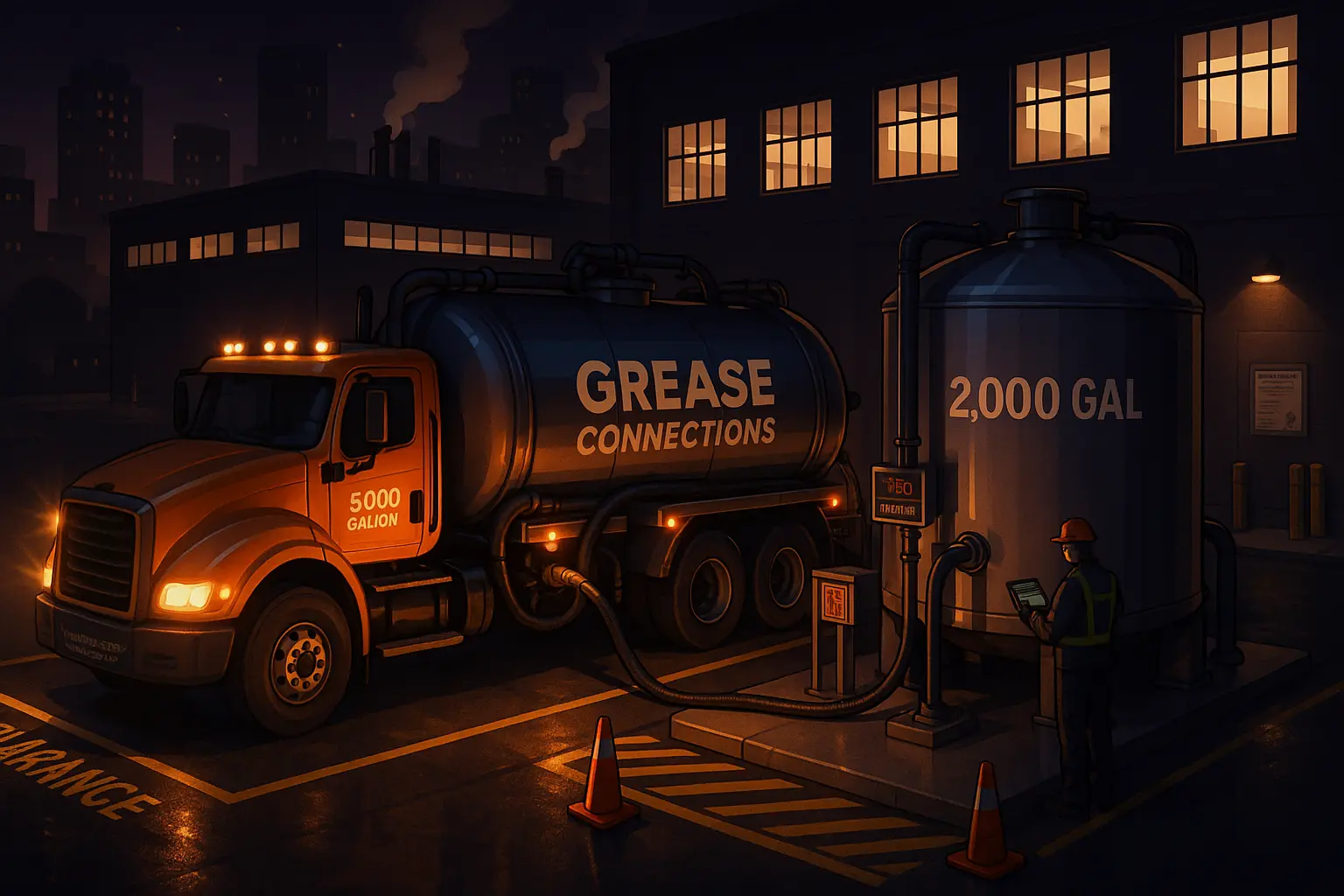Table of Contents
Can Anyone Really Move 2,000 Gallons a Week? Yes, and Here’s How
Industrial fryers and biofuel lines can fill a 2,000 gallon tank in five days. At that scale, collection shifts from drums to 5,000 gallon vacuum tankers, the industry’s standard road limit. Only collectors licensed as EPA ID transporters may haul that volume across state lines. Florida, Georgia, and New Jersey each cap on site storage to minimize fire risk and sewer spills. The practical takeaway: if your fryers pump out 400 gallons a day, you need tanker pickups at least twice weekly plus emergency “overflow” capacity. Grease Connections maintains a rolling reserve fleet so a truck swap is never more than three hours away, critical for 24/7 plants where downtime costs climb fast.

The Compliance Maze: Three States, One Set of Headaches
Florida’s Rule 62 710.850 demands above ground, labeled containers on secondary containment pads. Georgia’s Rule 391 3 6 .24 adds manifest retention for five years. New Jersey classifies used cooking oil as a Class D recyclable, but still requires EPA transporter IDs and annual reports. Across all three states, OSHA flammable liquid rules limit internal storage to 25 gallons and outdoor piles to 1,100 gallons unless diked and posted. Grease Connections embeds these limits in its routing software; tanks are emptied before hitting 80% capacity, so your facility never risks a fine or a shutdown order.
Capacity Counts: Why Fleet Size and Tech Matter
A single 5,000 gallon truck equates to 83 standard 60 gallon drums, slashing site traffic and labor. National data show vacuum bodies sell by capacity, starting at 3,500 gallons and topping out near 6,000 gallons for road worthy rigs. To meet 2,000 gallon weekly demand, you’ll need:
| Requirement | Minimum Spec | Why It Matters |
|---|---|---|
| Tanker fleet | ≥3 trucks stationed within 50 mi | Covers maintenance & surge loads |
| Pump rate | 150 gal/min | Clears a 2,000 gal tank in under 15 min to cut dock time |
| Digital meters | NTEP certified | Accurate volume data for EPA reports |
| Backup power | Truck PTO + portable genset | Keeps pumps running during outages |
Real time tank sensors send fill levels to dispatch every 15 minutes, letting Grease Connections auto schedule “milk run” routes and eliminate emergency fees.
Real 24/7 Readiness: Beyond a Phone Hotline
Compliance officers often discover that “24/7” in a brochure means voicemail after 5 p.m. One national waste firm’s fine print shows only online drum pickup requests, not live dispatch. True round the clock service blends people and tech: GPS tracked trucks, after hours drivers on retainer, and nighttime safety protocols that meet OSHA lighting rules. Grease Connections keeps a dispatcher, driver, and mechanic on rotating graveyard shifts. In 2024 we logged 312 midnight pulls with zero spills, zero violations. If sensors flag a rapid fill leak, the driver rolls within 60 minutes, preventing discharge that would spike biological oxygen demand in sewers.

Grease Connections: One Partner, Three State Hubs
Our Jacksonville, Atlanta, and Newark hubs each hold stainless 50,000 gallon buffer tanks. Oil is weighed, tested, and shipped to a 75 million gallon re refinery that runs nonstop. Centralized processing means fewer miles on the road and a 30% lower carbon footprint than the regional average, verified against EPA waste pathway baselines. For customers, that translates into a single contract, unified manifest portal, and one phone number with no juggling multiple vendors as you expand across state lines.
What Onboarding Day Looks Like
- Site walk through: We map fryers, lines, and tank pads, logging OSHA clearances.
- Sensor install: Wireless ultrasonic probes bolt on in 30 minutes; readings sync to our app.
- Compliance file upload: We import your last 12 months of manifests to prove chain of custody.
- Pilot pull: A tanker performs a full drain under supervisor watch to benchmark time and flow.
- Go live: Your dashboard switches from “monitor” to “auto schedule,” and you receive next pickup ETA.
One Northeast food processor cut overflow incidents from six per quarter to zero in 90 days, saving $18,000 in sewage surcharges (internal client report, 2025).
Cost, ROI, and Hidden Savings
Bulk tanker service costs about 15% less per gallon than drum pickup, according to industry surveys. Add avoided OSHA fines (up to $15,625 per incident for flammable liquid violations) and sewer use penalties that can top $10,000 per day. Grease Connections returns a quarterly dividend by buying your oil at market index, turning a waste stream into a revenue line. Many facilities net a positive cash value within the first month, an easy line item to defend at budget review. Link back to our Miami service page for a location specific quote.
Quick Grab Reference Table
| State | Agency | Key Rule | Hotline |
|---|---|---|---|
| Florida | DEP | 62 710.850 Used Oil | 850 245 8705 |
| Georgia | EPD | 391 3 6 .24 FOG | 404 657 5947 |
| New Jersey | DEP | Class D Used Oil | 609 984 4250 |
Agencies confirm that partnering with an EPA ID transporter and retaining manifests for at least three years meets baseline audit requirements.
Ready to Keep the Fryers Running?
Call Grease Connections today or book a 15 minute audit. You’ll know before the next shift starts exactly how your 2,000 gallons a week will disappear, legally and on time.









